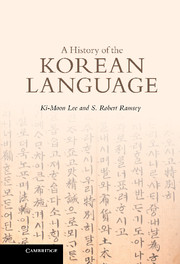Book contents
2 - The formation of Korean
Published online by Cambridge University Press: 05 June 2012
Summary
In the world today, few nations are as homogeneous as Korea. There are no ethnic or linguistic minorities anywhere in its indigenous population. But the kinship-like bonds of this nation, together with its ties to the land itself, have fostered a monolithic view of the past. There is a tendency among Koreans to think of every artifact taken from Korea's soil as the handiwork of their forebears, every ancient tribe as ancestors, all prehistoric languages as forms of early Korean. However, in the remote past the Korean peninsula was a multicultural place.
Just when Korea became so homogeneous is not altogether clear, but certainly, there was a time when many diverse groups of people lived in that part of the world. Such was clearly the case around the beginning of the Christian era. In 108 BC, when Han Chinese forces first established commanderies on the peninsula, the region was already filled with local polities. In their interaction with these local groups, a process which had already been going on for centuries, the Chinese transcribed a scattering of names as best they could in phonograms. Some of the group names are thus preserved in Chinese historical annals; and from these records we know a little about where they lived and how they related to each other. But little institutional memory of the languages remains. For the most part, the vague records left about the peoples on the Korean peninsula provide room largely only for guesswork.
- Type
- Chapter
- Information
- A History of the Korean Language , pp. 31 - 49Publisher: Cambridge University PressPrint publication year: 2011



